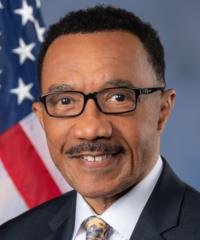
Kweisi Mfume (pronounced Kwah-EE-see Oom-FOO-may), was born, raised and educated in the city of Baltimore and it was there that he followed his dreams to impact society and to help shape public policy.
He attended Morgan State University in Baltimore, Maryland where as an honors student he graduated magna cum laude. He later returned there to join the staff as an adjunct professor teaching courses in Political Science and Communications. He was voted the University’s 2013 Alumnus of the Year.
Transformative Investments for Children and Caregivers 
As of 2024, all workers will be eligible for up to four weeks of paid leave for new parents, workers dealing with their own serious medical conditions, and workers who need leave to care for a loved one with a serious medical issue
Provides access to high-quality, universal, free, inclusive, and mixed-delivery preschool for 138,156 eligible preschoolers in Maryland 
Provides access to affordable and high-quality childcare to 370,000 young children in Maryland, costing eligible parents no more than 7% of their annual household income
Extends the Enhanced Child Tax Credit for households earning up to $150,000 
Provides an additional 55,000 Maryland students access to healthy and free school meals and another 430,954 children resources to access summer food options
Addressing the Climate Emergency
Provides $4 billion for reduction of carbon pollution in the surface transportation sector
Extends the production tax credit which allows energy producers to claim a credit based on electricity produced from renewable energy sources
Establishes a Civilian Climate Corps to address extreme weather, legacy pollution, and will create good-paying union jobs for Marylanders 
Provides $25 million in funding for Biden’s Justice40 initiative, which will allocate 40% of the overall benefits of relevant federal investments towards communities hit hardest by climate change. 
Critical Health Care Expansions 
Expands 34,000 uninsured Marylander's access to healthcare and includes hearing benefits
Gives the Health and Human Services Secretary the ability to negotiate lower drug prices
Caps out-of-pocket costs on drug spending in Medicare
Investments to diversify the doula, midwife, and OBGYN workforce  
Lowering the Cost of Higher Education
Increases the maximum Pell grant award by $550 to support over 84,000 students in Maryland who rely on Pell.
Expansion of federal student aid eligibility to Dreamers and students with temporary protected status (TPS) 
Maryland’s 17 minority-serving institutions and HBCUs will have access to grants that improve long-term capacity and development infrastructure 
Investment to enhance Maryland’s 16 public community colleges’ workforce programs, sector-based training, and apprenticeships 
Addressing America’s Housing Crisis
Provides 353,000 Maryland renters tenant-based rental assistance
Provides $65 billion to repair the nation’s public housing
Provides $25 billion to fund the construction, purchase, or rehabilitation of over 314,000 affordable housing units
Provides $3.05 billion in Community Development Block Grant funding for affordable housing and community infrastructure
Provides $1 billion in grants to help minority-owned businesses expand their operations
Improving Maryland’s Highways, Roads, and Bridges
Improving Maryland’s Public Transportation System
Building out Maryland’s EV Charging System
Expanding Internet Access for Marylanders
Strengthening Maryland’s Infrastructure Against Climate Change and Cyber Attacks
Delivering Clean Drinking Water to Maryland
Improving Maryland’s Airports
Small Business Assistance and Information
What are my options for obtaining capital to start or expand my business?
The SBA administers an array of loan programs to help businesses start, expand, and recover from disasters. Below are programs SBA offers to help your business succeed:
• The 7(a) Loan Program is SBA’s primary business loan program, assisting small businesses to obtain financing when they are unable to obtain traditional credit.
• The 504 Certified Development Company Program provides long-term, fixed rate financing for businesses to acquire real estate, buildings, or heavy equipment and machinery.
• SBA’s Microloan Program provides loans to non-profit intermediary lenders who in turn lend the funds in amounts of $50,000 or less to the smallest of small businesses and start-ups.
• The Small Business Investment Company (SBIC) Program provides long-term loans and equity capital to high- growth start-up businesses.
• The Community Advantage Program is a pilot initiative intended to increase the number of SBA lenders making loans to underserved communities.
• SBA provides low interest, long-term loans through its Disaster Loan Program to businesses of all sizes, private non-profit organizations, homeowners, and renters. These loans can be used for physical and economic damage caused by a declared disaster.